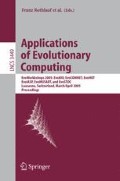Abstract
This paper describes an evolutionary approach to the optimization of element antenna arrays. Classic manual or automatic optimization methods do not always yield satisfactory results, being either too labour-intensive or unsuitable for some specific class of problems. The advantage of using an evolutionary approach is twofold: on the one hand it does not introduce any arbitrary assumptions about what kind of solution shows the best promise; on the other hand, being intrinsically non-deterministic, it allows the whole process to be repeated in search of better solutions. A generic evolutionary tool originally developed for a totally different application area, namely test program generation for microprocessors, is employed for the optimization process. The results show both the versatility of the tool (it’s able to autonomously choose the number of array elements) and the validity of the evolutionary approach for this specific problem.
Access this chapter
Tax calculation will be finalised at checkout
Purchases are for personal use only
Preview
Unable to display preview. Download preview PDF.
References
Baeck, T., Fogel, D.B., Michalewicz, Z. (eds.): Handbook on Evolutionary Computation. IOS Press, Amsterdam (1997)
Corno, F., Sanchez, E., Reorda, M.S., Squillero, G.: Automatic test program generation: a case study Design & Test of Computers. IEEE, Los Alamitos (2004)
Chellapilla, K., Hoorfar, A.: Evolutionary programming: an efficient alternative to genetic algorithms for electromagnetic optimization problems. In: Antennas and Propagation Society International Symposium, June 21-26, vol. 1, pp. 42–45. IEEE, Los Alamitos (1998)
Marcano, D., Duran, F.: Synthesis of antenna arrays using genetic algorithms. Antennas and Propagation Magazine, IEEE 42(3), 12–20 (2000)
Hoorfar, A., Zhu, J.: A novel hybrid EP-GA method for efficient electromagnetics optimization. In: Antennas and Propagation Society International Symposium, June 16-21, vol. 1, pp. 310–313. IEEE, Los Alamitos (2002)
Choi, S., Sarkar, T.K., Choi, J.: Adaptive antenna array for direction-of-arrival estimation utilizing the conjugate gradient method. Signal Processing 45 (1995)
Elliot, R.S.: Antenna theory and design Prentice-Hall, Inc., Englewood Cliffs (1981)
Rubinstein, R.Y.: Simulation and the Montecarlo Method. John Wiley and Sons, New York (1981)
Author information
Authors and Affiliations
Editor information
Editors and Affiliations
Rights and permissions
Copyright information
© 2005 Springer-Verlag Berlin Heidelberg
About this paper
Cite this paper
Manetta, L., Ollino, L., Schillaci, M. (2005). Use of an Evolutionary Tool for Antenna Array Synthesis. In: Rothlauf, F., et al. Applications of Evolutionary Computing. EvoWorkshops 2005. Lecture Notes in Computer Science, vol 3449. Springer, Berlin, Heidelberg. https://doi.org/10.1007/978-3-540-32003-6_25
Download citation
DOI: https://doi.org/10.1007/978-3-540-32003-6_25
Publisher Name: Springer, Berlin, Heidelberg
Print ISBN: 978-3-540-25396-9
Online ISBN: 978-3-540-32003-6
eBook Packages: Computer ScienceComputer Science (R0)

